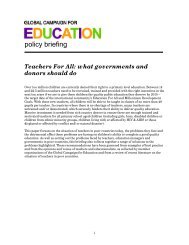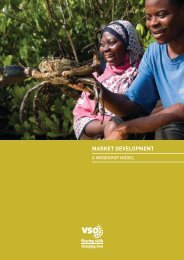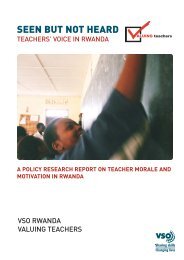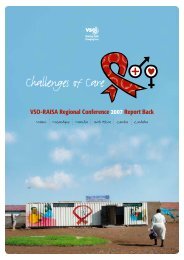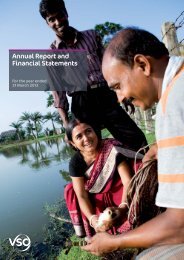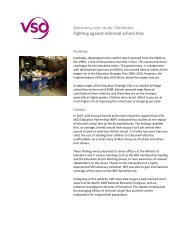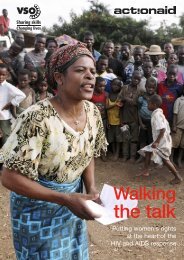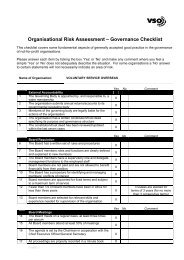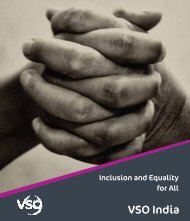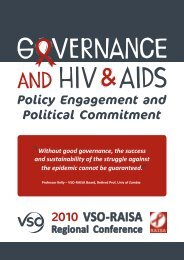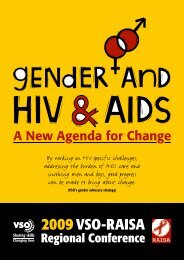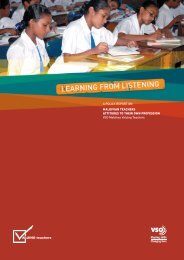Teachers' Voice â Nigeria - VSO
Teachers' Voice â Nigeria - VSO
Teachers' Voice â Nigeria - VSO
- No tags were found...
You also want an ePaper? Increase the reach of your titles
YUMPU automatically turns print PDFs into web optimized ePapers that Google loves.
Teachers assert that this is not only done by parents and society, but also by the government.Misconceptions, misunderstanding and ignorance call for an awareness campaign to educatepublic and professionals on this subject immediately.7.1.3 SPECIAL NEEDS EDUCATION: STAKEHOLDERS’ VIEWSStakeholders in this sector believe the government has not devoted much effort to this field andso it relies on the private sector. They maintain this is due to lack of interest, knowledge andawareness, aggravated by the lack of statistics on special needs. Insufficient data means thatthe government keeps overlooking and disregarding its importance.Stakeholders recognise the need for more and better training in CoEs across <strong>Nigeria</strong> in thisarea. They recommend an increase in the number of colleges delivering inclusive educationtraining and advise a more practical training curriculum compared to the present fact-basedapproach. This will improve the delivery of education for children in this specialised area.The classroom curriculum is said to be too fact and theory based and needs to be more practicaland relevant. Special needs schools confess they follow their own curriculum, which they haveadapted to be more suitable and relevant to the needs of their pupils.All the stakeholders agree that it is essential for government to invest more into developing thispart of education.7.1.4 SPECIAL NEEDS EDUCATION: RECOMMENDATIONS<strong>VSO</strong> recommends the following:• The FME should amend special needs school curricula to make them more practical, relevant andup to date. This means involving all stakeholders in special needs education, including teachers.• The NCCE should increase the number of CoEs delivering inclusive education training.• The FME should commence a nationwide campaign to raise awareness on the inclusion ofchildren with special needs; the importance, value and access of education; and informationfor parents, schools and communities on supporting children with special needs, in conjunctionwith the MoH.• The FME should provide support services for families and children with special needs, includinginformation centres and the availability and provision of learning resources and equipment grants.7.2 STUDENT–TEACHER INTERACTIONTeachers participating in this research project state they are affected by their daily interactionswith their pupils and recognise good pupil performance as a motivating aspect of their job.Seeing motivated pupils encourages teachers to improve their techniques; however themotivated pupils realise that overpopulated classrooms, discipline issues and the delivery ofunplanned lessons hampers them. Pupils with low motivation towards learning frustrateteachers and this results in the increased use of corporal punishment and teacher demotivation.It is, therefore, clear that student–teacher interaction can be motivating and demotivatingdepending on the circumstances.7.2.1 STUDENT–TEACHER INTERACTION: POLICY FRAMEWORKNational education polices do not explicitly outline anything about interaction between teachersand students.7.2.2 STUDENT–TEACHER INTERACTION: TEACHERS’ VIEWSTeachers describe how happy it makes them when a child learns something they have taught –for instance when a child comes to school punctually and well-dressed; when children are hardworking and well-behaved; and when they can help children to learn and grow.42



